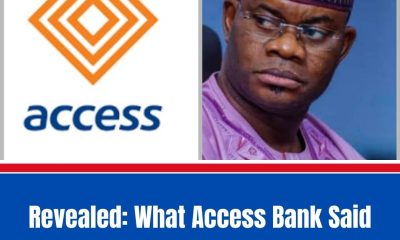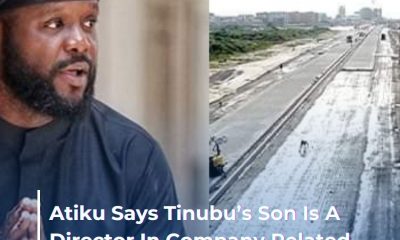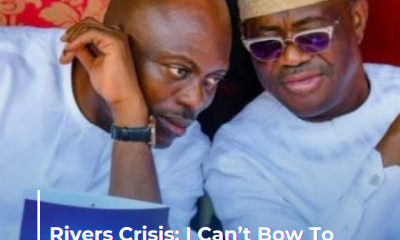News
Osinbajo: Nigeria’s $2.3 trillion infrastructure deficit will be resolved through public-private sector cooperation

Ibekimi Oriamaja Reports
According to the Vice President, Prof. Yemi Osinbajo, cooperation between the federal government and the private sector would not only ensure effective coordination of the development of infrastructure across the country and in all economic sectors, but would also help Nigeria close its $2.3 trillion infrastructure deficit.
Osinbajo added that cooperation between the federal government and the private sector would fill infrastructure gaps in the country and promote effective coordination of infrastructure development across the country and all economic sectors.
According to him, the National Council on Infrastructure was established by the Buhari government primarily for this reason.
Osinbajo officially inaugurated the Council during a virtual meeting that he presided over, and according to Senior Special Assistant to the President on Media & Publicity Laolu Akande in a statement yesterday, “for efficient and effective implementation of infrastructure projects, the National Integrated Infrastructure Master Plan recommended the establishment of the National Council on Infrastructure and its Technical Working Group (TWG).”
The National Integrated Infrastructure Master Plan of the Buhari administration, according to the vice president, was created to offer “an integrated view of infrastructure development in Nigeria with clear linkages across key sectors and identifies enablers for successful implementation in line with the current economic realities.”
The National Integrated Infrastructure Master Plan assesses the state of the country’s infrastructure and, according to the VP, sets a target of increasing Nigeria’s infrastructure stock to at least 70% by the year 2043.
The National Integrated Infrastructure Master Plan’s success, continued Osinbajo, “would rest, in large part, on the construction of a strong implementation mechanism and framework that fosters performance and accountability.”
The National Council on Infrastructure, specifically, “is to provide policy direction on infrastructure matters and drive the creation and sustenance of the expected synergy and linkages between the public and private sector to enhance the implementation of the Infrastructure Master Plan,” Osinbajo added. Meanwhile, the Technical Working Group is to guide the Council and advise on all infrastructure-related issues.
Osinbajo noted that the governance framework complies with international best practices and added that “a well-coordinated and strategic strategy will be necessary to harness private resources to raise the stock of Nigeria’s infrastructure to the desired level by the year 2043.”
Osinbajo emphasized the purposeful and significant investments made by the Buhari administration in road, rail, and electricity infrastructure for rapid economic development despite significant infrastructural gaps throughout the nation.
A thoughtful and significant investment in infrastructure is a key component of the administration’s strategy for the quick growth of the economy, the VP said.
The second Niger bridge, the Lagos-Ibadan expressway, the Abuja-Kaduna-Kano Road (financed by the Presidential Infrastructure Development Fund), and the building and upgrading of around 5,000 km of significant road projects nationwide via the Sukuk bond are among them.
The VP said, “Investments in the rail sector include the Warri-Itakpe rail, the Lagos Kano standard gauge lines, To support systemic reforms and investments in the Distribution and Transmission segments of the electricity value chain, this administration has approved NLNG Train 7, invested in the Ajaokuta-Kaduna-Kano (AKK) pipeline, and is on track to complete an additional 4,000 MW of generating assets (such as Zungeru Hydro and Kashimbilla Hydro).
“The administration is investing more than $2 billion in Distribution and Transmission through the Siemens Presidential Power Initiative, the Transmission, Rehabilitation and Expansion Plan, the CBN-financed Transmission-Distribution Interface Programme, and the recently approved $500 million World Bank DISREP program for the Distribution segment,” added Osinbajo.
In a similar vein, the vice president pointed out that the federal government established the N15 trillion Infrastructure Corporation (InfraCorp Nigeria) last year and that the president also signed Executive Order 7, which has shaped the appropriate policy framework and opened up some opportunities for Public Private Partnership (PPP) in infrastructure development.
The Vice President added, “The Reviewed National Integrated Infrastructure Master Plan (2020-2043) and the National Development Plan 2021-2025 also estimated that the current nation’s infrastructure stock would be between 30-35 percent of the GDP in 2020 compared to 20 percent of the GDP recorded at the beginning of this administration in 2015.” This further emphasized the significance of private sector participation, the Vice President said. The predicted aim of 70% anticipated in 2043 is still a long way off.
Osinbajo cited the National Integrated Infrastructure Master Plan’s anticipated $2.3 trillion resource demand as evidence that this point could not be supported only by public funding.
In his remarks, the Vice President was congratulated for his leadership and selfless service to the country by the Minister of State for the Budget and National Planning, Mr. Clem Agba.
Engineer Ahmed, President of the Manufacturers Association of Nigeria (MAN), and Engineer Tasiu Wudil, a representative of the Nigeria Society of Engineers (NSE), both of whom were present and who are also members of the new Council, both applauded the Council’s inauguration.
The Vice President serves as the National Council on Infrastructure’s chair, and its members include federal ministers, heads of government agencies, representatives of state governors, and business leaders.
Other members include the governor of Ekiti State and chairman of the Nigeria Governors Forum, Dr. Kayode Fayemi; the ministers of finance, budget, and national planning, Dr. (Mrs.) Zainab Ahmed; the attorney general of the federation and minister of justice, Abubakar Malami; the minister of works, Babatunde Fashola, SAN; the ministers of power, Engr. Abubakar Aliyu; the ministers of transportation
-

 Gist6 days ago
Gist6 days agoMy Boss Used To ‘KNACK’ My Wife After Sending Me On A Mission, To The Extent She Got… – Ex-soldier
-

 News5 days ago
News5 days agoCooking Gas Price Has Fallen
-

 Politics5 days ago
Politics5 days agoRevealed: What Access Bank Said About Its Dealings With Yahaya Bello
-

 News7 days ago
News7 days agoFake Reverend Sister Arrested With 38 Children
-

 News5 days ago
News5 days agoRead How Auxiliary Was Whisked Away By Masked Security Agents as Family member Speaks
-

 Sports4 days ago
Sports4 days agoFinidi agrees deal with NFF, names three foreign assistants
-

 Politics4 days ago
Politics4 days agoAtiku Says Tinubu’s Son Is A Director In Company Related To Coastal Road Contract
-

 Politics4 days ago
Politics4 days agoRivers Crisis: I Can’t Bow To Wike, He’s Not God – Fubara




